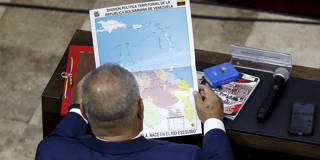In an effort to divert attention from his numerous missteps ahead of the 2024 election, Venezuelan President Nicolás Maduro is threatening to annex neighboring Guyana’s oil-rich Essequibo region. Brazilian President Luiz Inácio Lula da Silva must assert his authority to prevent further destabilization.
SÃO PAOLO – The Brazilian government, eager to assert itself as South America’s preeminent power, finds itself at a crossroads. The victory of libertarian opportunist Javier Milei in Argentina’s recent presidential election has added a new element of uncertainty to Brazil’s relationship with its southern neighbor. Meanwhile, Venezuelan President Nicolás Maduro’s threats to annex Guyana’s oil-rich Essequibo region jeopardize the increasingly fragile alliance between Brazil and its northern neighbor.

SÃO PAOLO – The Brazilian government, eager to assert itself as South America’s preeminent power, finds itself at a crossroads. The victory of libertarian opportunist Javier Milei in Argentina’s recent presidential election has added a new element of uncertainty to Brazil’s relationship with its southern neighbor. Meanwhile, Venezuelan President Nicolás Maduro’s threats to annex Guyana’s oil-rich Essequibo region jeopardize the increasingly fragile alliance between Brazil and its northern neighbor.